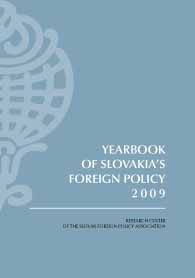Slovak Foreign Policy in 2009 Through the Eyes of the Foreign Minister
Slovak Foreign Policy in 2009 Through the Eyes of the Foreign Minister
Author(s): Miroslav Lajčák
Subject(s): Politics, International relations/trade, EU-Approach / EU-Accession / EU-Development
Published by: Research Center of the Slovak Foreign Policy Association (RC SFPA)
Keywords: 2009; Slovakia; foreign policy; foreign minister; EU; economy; energy; security;
Summary/Abstract: The year 2009 could be, without much exaggeration, labeled a year of extraordinary challenges and important issues. On January 1, 2009 Slovakia joined the Euro Zone, but since immediately afterwards we faced an unprecedented energy crisis, there was hardly any time left to celebrate this economically and politically significant step. Three organizations we regard as exceptionally important decided to substantially change their way of operating or to prepare such changes. Although it was not easy, the European Union finally completed the process of ratification of the Treaty of Lisbon successfully. The North Atlantic Alliance came to terms regarding the elaboration of a new Strategic Concept. Discussion on the future of European security within the framework of the Corfu Process was also launched by the Organization for Security and Co-operation in Europe. All three large-scale processes were going on against the background of an issue that last year as possibly the most important challenge of all – the global financial and economic crisis. It forced us to partly reassess our original priorities for 2009. All available capabilities including those of the Slovak Foreign Service were directed at mitigating the impact of the crisis and at searching for efficient solutions. As the global financial and economic crisis will probably redraw not only the economic, but also the world’s map of political influence and power, besides operative tasks we also needed to raise several strategic and conceptual issues. Besides the issues and challenges just mentioned some other topics could also be listed that directly influenced the interests of the Slovak Republic. The crises of the previous year were changing our view of the Central European region as well as of Europe’s position in the world. The Eastern Partnership project was commenced, discussion on the Danube strategy was intensified, NATO was further enlarged and some ‘old new’ and completely new EU institutions were created. As well as that the world and Slovakia were at the same time discussing the impacts of climate change, the Iranian nuclear program and the stabilization of Afghanistan. Last but not least, the general improvement in the international atmosphere that followed when the new American administration came into office and the emphasis that it puts on rendering the tools of multilateralism more efficient should not be disregarded.
Book: Yearbook of Slovakia's Foreign Policy 2009
- Page Range: 9-18
- Page Count: 10
- Publication Year: 2010
- Language: English
- Content File-PDF

